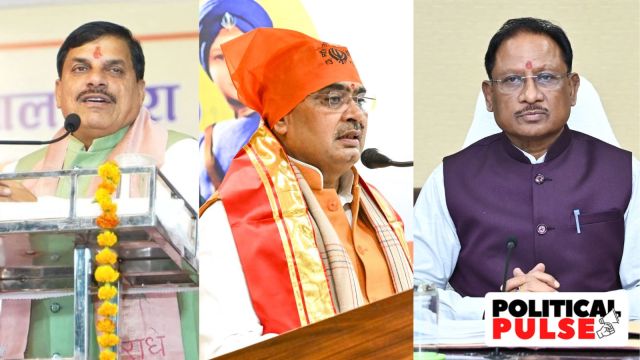No one outside the BJP – and many within the party – saw it coming.
When the ruling party swept to power in the Hindi heartland states of Madhya Pradesh, Rajasthan and Chhattisgarh months before the important Lok Sabha elections, conventional political wisdom dictated that the party would fall back on its proven warhorses Shivraj Singh Chouhan in MP, Vasundhara Raje in Rajasthan, and Raman Singh in Chhattisgarh.

However, the BJP’s top leadership picked three completely new faces to lead the governments in the three states, a move lauded by its admirers as a bold gambit. The selections were described as an example of “out of the box” decision-making in an attempt to balance caste equations and class dynamics.
Story continues below this ad
As Madhya Pradesh CM Mohan Yadav, Rajasthan CM Bhajan Lal Sharma and their Chhattisgarh counterpart Vishnu Deo Sai complete a year in office, an appraisal shows that it has been a mixed bag. While all three leaders have ensured organisational unity by and large, political authority still escapes them and they have not made any big impression on the administrative front either.
National BJP leaders argue that one year is too short a time to establish political clout. And that they meet the qualities that the party’s central leadership values: they are not regional satraps, and their selection showcases the organisation’s resilience.
A senior BJP leader said: “These three are mostly organisation-driven states and the party drives the leadership there.”
Bhajan Sharma’s tough climb in Rajasthan
Of the three, Bhajan Lal Sharma has had the toughest time. The BJP functionary quoted above notes the overarching presence of Raje still in the state. “A two-term CM, she is present and active and still wields influence in the state unit. The pressure is always there on the new CM.”
Story continues below this ad
What added to the pressure on Sharma was the Congress’s performance in the Lok Sabha elections held after the Assembly polls, where it picked up eight seats this time, after clocking 0 in the past two elections.
For the CM, who is a first-time MLA, the pressure only eased after the BJP trumped the Congress in the Assembly by-elections last month, winning five of the seven seats at stake.
“This victory not only boosted the morale of the cadre but also gave a fresh lease of life to the CM, who was struggling to make a mark,” said a BJP MP from Rajasthan. Earlier this month, in another plus, the Sharma government managed to get investment commitments worth Rs 35 lakh crore from leading industrialists.
However, a party leader said that Sharma has still been found wanting on “leadership qualities”. “Raje had many rivals but she had leadership qualities and could also manage a good governance record. She succeeded in building a good team. I do not think Sharma has been able to understand the aspirations of either party workers or the people of the state.”
Story continues below this ad
A BJP leader pointed to the lack of improvement on the law and order front, over which the party had consistently attacked the previous Ashok Gehlot regime, as well as the failure to make significant progress on the paper leak issue.
However, as the leader put it, an “experiment” of going with a new face was always going to be risky, and the high command was not expected to backtrack on it.
Another party functionary explained why someone like Sharma was important. “He is the only Brahmin CM in the BJP’s main catchment areas.”
Madhya Pradesh allows space to Mohan Yadav
The choice of newbie Mohan Yadav appears to have worked in the state, with BJP leaders saying he has established his authority in the absence of Chouhan, who has been moved to the Centre. Since taking power, the Yadav government has held investor summits across the state, not just in capital Bhopal but also metro cities.
Story continues below this ad
The government has also hewed close to the BJP’s core constituency of Hindu voters and, soon after assuming charge last year, issued an order banning the use of loudspeakers at religious places beyond permissible limits; announced an “intensive campaign” to check “illegal buying and selling of meat, fish, etc”; and made budgetary provisions for the protection of cows.
The government also took steps to crack down on the illegal slaughter of cows, asking the local police to crack down on cattle smuggling. The government observed 2024 as the year of cow protection.
Yadav has also emphasised developing religious sites connected to Lord Krishna, who is revered in the Yadav community to which the CM belongs.
Slower rise for Vishnu Deo Sai in Chhattisgarh
BJP leaders said Chhattisgarh was not a “dynamic state” where a leader could do things to capture imagination overnight. “Raman Singh (three-term CM) took time; in fact, he became a popular and accepted leader only during his third term,” said a BJP leader familiar with politics in the state.
Story continues below this ad
However, state BJP leaders admitted, what has been worrying them is Sai’s “inability to wield power”. One leader said, “The cadre is disturbed. Officials call the shots and the chief minister is not able to control things. The only advantage for him now is the weakening Congress. The party lost its hold in the state so the BJP should perform well in the coming municipal elections too. But the CM is a good man, means no harm.”

































